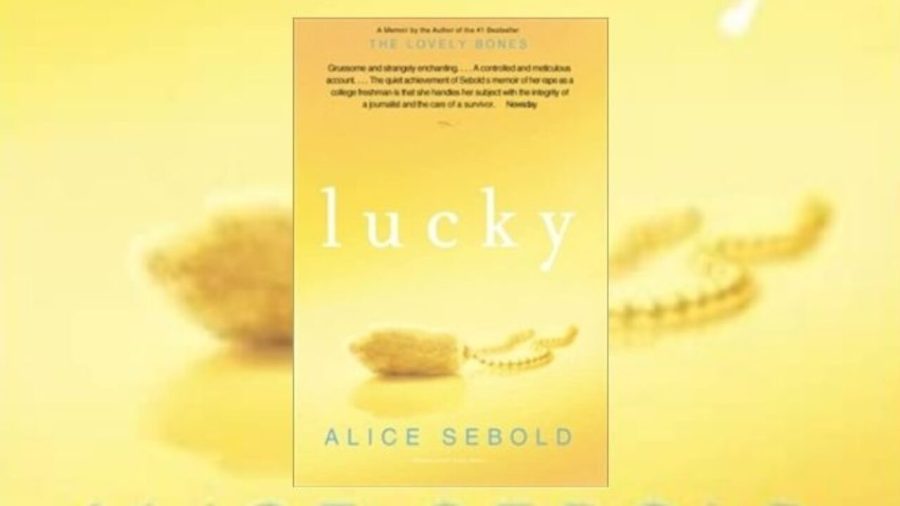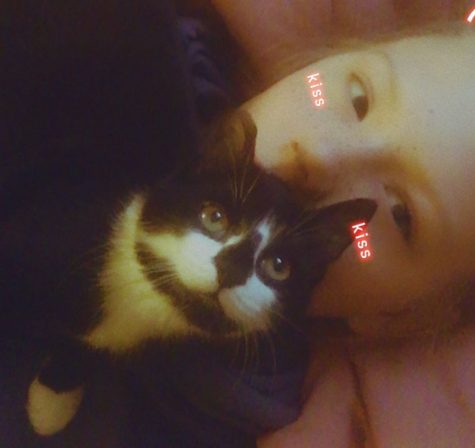Book Review: Lucky
April 2, 2022
How the Lucky can be just as unlucky…
Before I get into anything regarding this book, I have to express the trigger warnings as to not upset anyone as they read this review. These trigger warnings include: sexual harassment, rape, murder, alcohol addiction, and drug use. Please advise my warning. There will also be spoilers in the later section of this as well.
For my English class, we complete a book report every quarter. For quarter three, I did my book report on the memoir Lucky written by Alice Sebold. I want to first talk about why I chose this book. I wasn’t sure of what kind of book I wanted to read, but I knew I wanted something that was going to make me think. About a year ago, I read The Lovely Bones which was a fiction book written by the author. It was about a young girl who was raped and murdered. She watched her family live on as she made her journey to the next part of the afterlife. Knowing I already liked the author’s writing style, I knew this would be a safe choice. When I previewed the back cover, I knew it was something I had to read.
The first thing to say is that it took her about 13 years to write her book. She wrote some articles about it in the New York Times but she first had to accept the fact that it took her so long to write the book.
In 1981, at midnight, one night in May, Alice Sebold was brutally attacked and raped in a park near her dorms at Syracuse University, New York. The first portion of the book is about the months directly after the rape and how she learned to cope with it. She decides to go back to college the following year. After this, in October, she runs into her rapist on the street. This is when she starts the legal proceedings. She makes a sketch and goes to the police. The next section of the book is her trial, leading up to her rapist getting convicted and sent to jail. After this, she tries to take her life back and move on. After another traumatic event, she goes into a downward spiral and the last portion of the book is about this, and how she climbed out of it.
***SPOILERS*** I am serious– do not continue reading if you don’t want to know anything further!
The author wrote this book to tell her story. She wanted to warn people of the dangers that the world holds and how the legal system can proceed with a case. The hardest part about reading this book was how much it reminded me of myself and something I went through. I will say that I thoroughly enjoyed reading it. It made me think about a lot of things I never would have thought of. After the attack, she goes back home for the summer. I questioned if many people would do that, instead of continuing with the police to catch their attacker. Later on, she talks and explains her thought process while she was reporting the sighting. It always made me wonder, why did I never report him. 690 out of 1,000 cases, or 69% of cases, go unreported to the police. This was a question I was stuck on, and in a little way, I still am. This brings up another question, how many people feel like I do?
After she had run into her rapist on the street, the legal proceedings started. When they believed they had caught the right guy, Alice was presented with a lineup. In a room behind a two-way mirror, she saw 6 guys. When she was trying to choose who her rapist was, she was torn between two people, number 4 and 5. She expressed that they looked like “identical twins.” She had chosen number 5 because he was looking at her. When she exited the room, she thought she had chosen wrong and that the guy was number 4. The person in the room with her said she wasn’t allowed to say anything but hinted toward Alice being correct in her assumption. Later on, she was told that she did choose the wrong person, only because number 5 was looking at her while 4 wasn’t.
It turned out when the results from the DNA test came back, she had chosen correctly. The DNA sample from her the night of the attack matched the DNA sample taken from the suspect. However, they had already suspected, Anthony Broadwater, who is called Gregory Madison in the book. When the court proceeded, they took him as the suspect instead of number 5.
This is the point in the book where I realized something was weird. She never should’ve hinted that she chose the wrong person. To maintain professionalism, the workers of the court are not allowed to sway a victim. However, Alice Sebold was swayed.
The court proceeded with Anthony Broadwater. After pages and pages of dialogue, the trial ends. Anthony Broadwater was sentenced to 8. 5 to 25 years in prison in 1882. I felt weird about the entire trial. I don’t know much about the law or house courtrooms are supposed to be run, but something just didn’t feel right. I shook it off and continued reading. Alice Sebold moved on with her life.
After the trial, she returned to school and got an apartment with her best friend. They loved living with each other, and their roommate, and continued living their best college life. Alice learned how to live with what happened and moved on. This all came crashing down one night. Her best friend had been raped in their home, on Alice’s bed. Her theory is that the attacker was getting revenge for Broadwater, but this was never confirmed. She and her best friend never recovered their friendship.
Alice went down a dark path. She started doing drugs to escape her thoughts. She lived this way for years.
After a while, she decided enough was enough. She started working for a college and she became a safe place for many of her students. Throughout her time there, she wrote a couple of articles for the New York Times, talking about what happened. As I said earlier, it took her 13 years to write her book. She wasn’t necessarily ready, she was upset that it had taken her so long to actually tell her story. Once she got over her anger, she started writing. She published Lucky in 1999. She became famous for her book.
That is the end of the book review, however, here comes the interesting part.
As I stated, the entire trial was weird. There was something that was off about the entire thing, starting from even before the lineup. She picked number 5 and his DNA matched, however, it was hinted that she chose the wrong person. During the trial, there were many questions that should’ve gotten flagged. It was argued that she didn’t actually see the man as her glasses were knocked off during the attack.
In 1998, Broadwater was released from prison on parole and was forced to register as a sex offender.
Before the lineup, officers selected the people who would be involved. Broadwater was unhappy with the person they put in the 5th position and requested a change. This was not approved. The partial fingerprint that the police got from the knife could not be linked to Broadwater. Despite her choosing 5, the DNA matching, and a lack of physical evidence to prove Broadwater was not the attacker, he was brought to the stand.
In 2020, there was a plan to turn Sebold’s memoir into a film. This is where everything was discovered.
Timothy Mucciate, working as an executive director, noticed that something was off in the trial. He was confused about how little evidence there was, none of it is reliable. He hired private investigator Dan Meyers who helped uncover that Anthony Broadwater was wrongly convicted of rape and sentenced to prison. After 16 years, his charges were dropped.
Alice Sebold made a public apology. She stated ¨I am sorry most of all for the fact that the life you could have led was unjustly robbed from you and I know that no apology can change what happened to you and never will. It has taken me these past eight days to comprehend how this could have happened.” She had unknowingly played a role in an unjust system.
This shows how unjust the system can be. A man was sentenced to prison for a crime he had no part in. Not only did a man lose the rest of his life, but a rapist was also let free. Anthony Broadwater will never know the life he could’ve lived and Alice Sebold will never know who the rapist was. One man lost his life, while another went free.
“You save yourself or you remain unsaved.”


